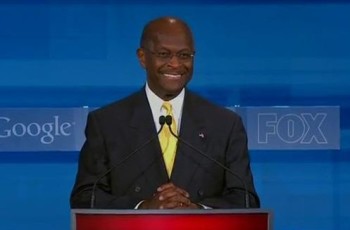
Herman Cain, pictured above. (Credit YouTube, screenshot)
We have a new phantom frontrunner for the GOP presidential nomination: former Godfather’s Pizza CEO Herman Cain. He’s not the frontrunner exactly, but as the New York Times reports, Mitt Romney and Cain are “essentially tied [for first place] within the [Quinnipiac] poll’s margin of error.”
Cain’s alleged surge to the top tier of candidates comes in the wake of Rick Perry’s less-than-stellar debate performance in Florida, and Cain’s subsequent surprise victory in the straw poll, trouncing Perry by greater than a two-to-one margin.
Some pundits are impressed with Cain’s rise in the national polls, among them Mark Blumenthal, who — as the founder of pollster.com, a website devoted to explaining what polls really mean (and which is now a part of Huffington Post) — should know better. He refers to “Rick Perry’s September swoon,” but goes on to opine, “The bigger story may be the sudden rise of support for businessman Herman Cain” – characterizing the businessman’s “ascent” in the polls as “impressive.”
 But don’t be fooled once again. Cain is no more a frontrunner for the GOP nomination than Rudy Giuliani was four years ago, when he led the national polls for almost all of the year, until shortly before the first actual state contest began – which he lost. And he lost all other state contests, ending up with not a single delegate to the Republican National Convention.
But don’t be fooled once again. Cain is no more a frontrunner for the GOP nomination than Rudy Giuliani was four years ago, when he led the national polls for almost all of the year, until shortly before the first actual state contest began – which he lost. And he lost all other state contests, ending up with not a single delegate to the Republican National Convention.
The Mythical National Primary
Though I’ve written about the mythical national primary before, it’s worth noting that most pollsters and pundits simply ignore history and continue to pretend that polls of Republicans nationally have some predictive or explanatory function for a primary campaign.
But it’s important to remember: There is no national primary. Instead there are a series of state contests, with the field of candidates narrowing quickly after the Iowa Caucuses and New Hampshire Primary. By the time many of the later-scheduled contests occur, there may be only a couple of candidates actually in contention. Candidates who don’t fare well in the early contests are not even around for the later ones.
To poll Republicans nationally ignores the winnowing process of the early contests. National polls treat all voters as if they have the same clout in determining the nominee. They don’t.
In 2008, Giuliani decided not to campaign in any of the early state contests, waiting until the Florida Primary – but by then, he had been forgotten in the media coverage of the candidates who had participated in the earlier contests. He lost Florida badly and got no delegates, thus demonstrating (if politicians didn’t already know it) that national polls in the year before the primary contests don’t measure the voters who really count – the ones who live in Iowa, New Hampshire, Nevada and South Carolina.
What makes Cain’s position analogous to Giuliani’s is that Cain, apparently, doesn’t expect to campaign heavily in the early states. Susan Saulny of the New York Times reports that Cain isn’t interested in traditional campaigning, and instead is using his newly acquired celebrity to launch a book tour. “An adviser to the campaign said the campaign had only four people working in Iowa,” Saulny writes, “and there is no plan to change strategy.”
Cain told the reporter, “We have a strong base there [Iowa] and will be going back. We didn’t have a front-loaded Iowa-New Hampshire strategy. No, we’ve got a multistate strategy, so we’ll get back to Iowa in due time.”
Good luck with that! Former Vice President Al Gore tried that strategy in 1988, waiting for the Southern Primaries, all but skipping Iowa and New Hampshire – and got nowhere. Giuliani tried a similar tactic in 2008.
This is not to say that Cain cannot revise his strategy and make a serious campaign effort in the early states. If he can raise the money and persuade himself to make the effort, possibly he could rise to the top tier off the GOP candidates. But there’s no evidence to show that he’s there now. And don’t trust the national polls to tell us what they can’t.
David W. Moore is a Senior Fellow with the Carsey Institute at the University of New Hampshire. He is a former Vice President of the Gallup Organization and was a senior editor with the Gallup Poll for thirteen years. He is author of The Opinion Makers: An Insider Exposes the Truth Behind the Polls (Beacon, 2008; trade paperback edition, 2009). Publishers’ Weekly refers to it as a “succinct and damning critique…Keen and witty throughout







